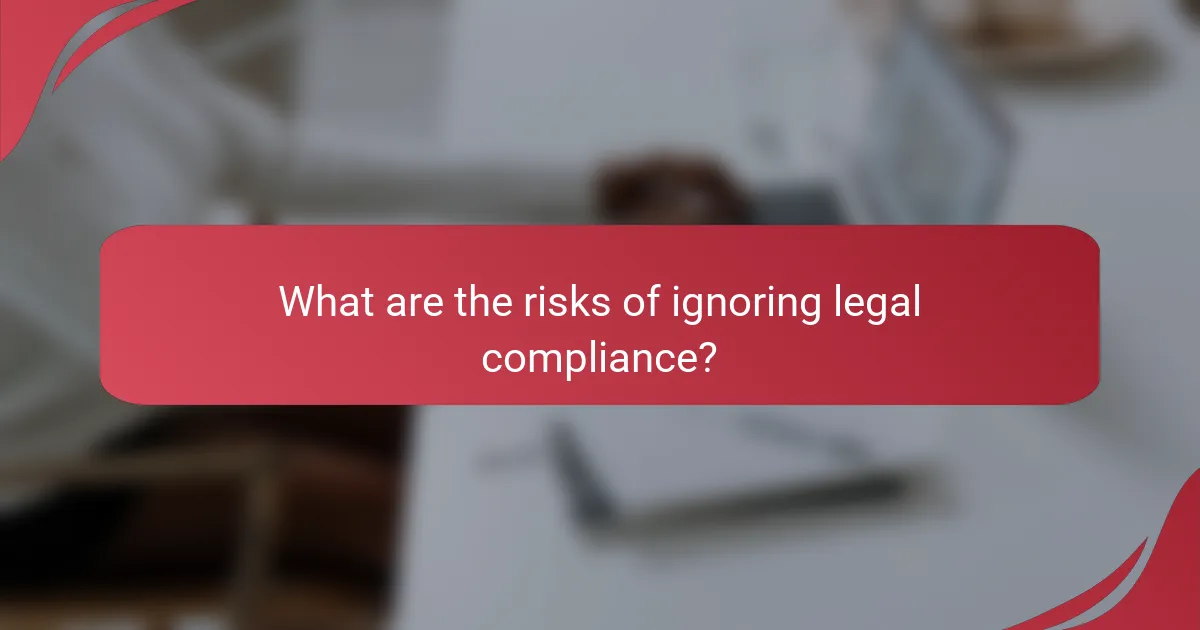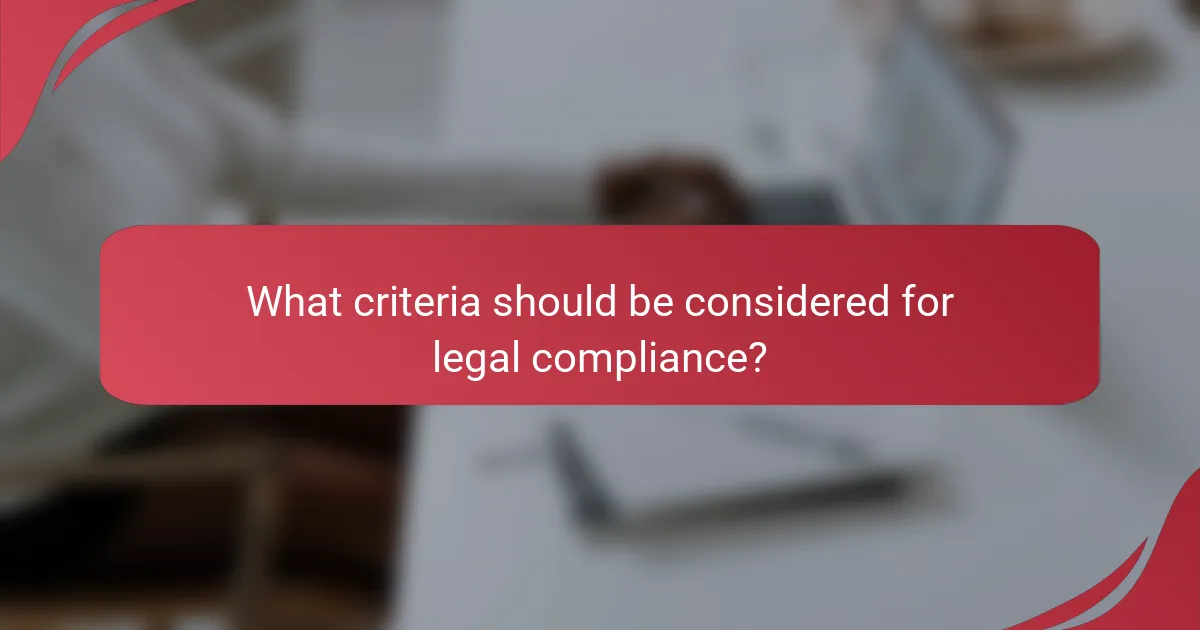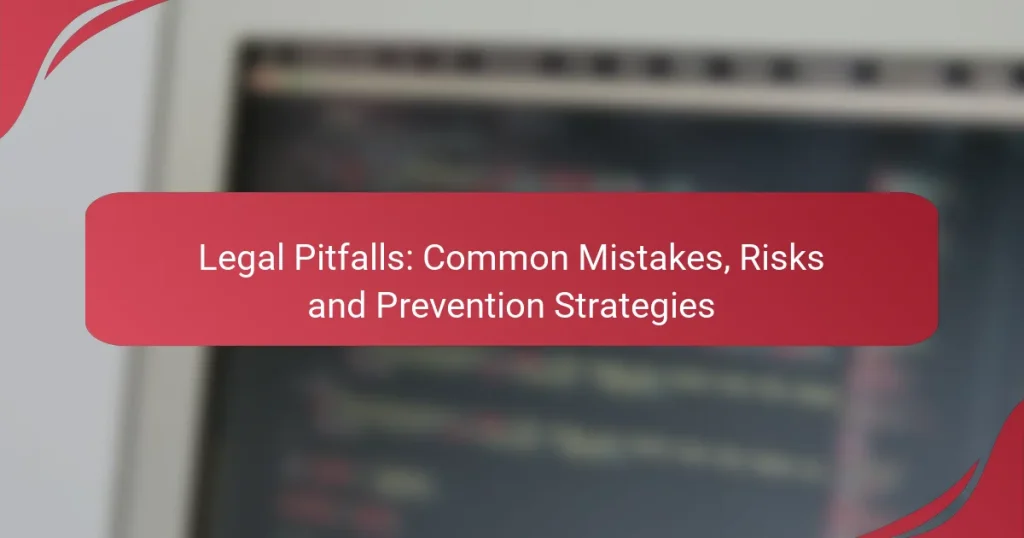In the rapidly evolving world of e-commerce, businesses face various legal pitfalls that can jeopardize their operations and reputation. Common issues include intellectual property disputes, consumer protection violations, and data privacy concerns. By understanding these risks and implementing effective prevention strategies, companies can safeguard themselves against costly legal challenges and maintain a strong online presence.

What are the common legal pitfalls in e-commerce?
Common legal pitfalls in e-commerce include issues related to intellectual property, consumer protection, data privacy, contractual obligations, and tax compliance. Understanding these risks can help businesses avoid costly legal disputes and maintain a trustworthy online presence.
Intellectual property infringement
Intellectual property infringement occurs when a business uses another party’s trademarks, copyrights, or patents without permission. This can lead to lawsuits and significant financial penalties. To avoid this, conduct thorough research on existing IP rights before launching products or marketing campaigns.
Consider registering your own intellectual property to protect your brand. Regularly monitor the market for potential infringements on your IP rights, and take action promptly if you discover violations.
Consumer protection violations
Consumer protection violations happen when businesses fail to comply with laws designed to safeguard buyers, such as false advertising or inadequate return policies. These violations can result in fines and damage to your reputation. Ensure that your marketing materials are truthful and that your return policies are clearly communicated to customers.
Familiarize yourself with local consumer protection laws, as they can vary significantly by region. For example, in the EU, consumers have a right to a 14-day cooling-off period for online purchases.
Data privacy breaches
Data privacy breaches involve unauthorized access to sensitive customer information, which can lead to legal repercussions and loss of customer trust. Compliance with regulations like the GDPR in Europe or CCPA in California is crucial. Implement strong security measures and regularly update your privacy policies to reflect your data handling practices.
Consider conducting regular audits of your data protection measures and training your staff on best practices for handling customer information to mitigate risks.
Contractual disputes
Contractual disputes arise when parties involved in an agreement fail to meet their obligations, leading to potential legal action. To minimize this risk, ensure that all contracts are clear, detailed, and legally binding. Use standard templates where appropriate, but customize them to fit your specific business needs.
Regularly review and update contracts to reflect changes in your business operations or legal requirements. Establish a clear process for resolving disputes, such as mediation or arbitration, to avoid lengthy court battles.
Tax compliance issues
Tax compliance issues can occur when e-commerce businesses fail to adhere to local tax laws, leading to audits and penalties. It’s essential to understand the tax obligations in each jurisdiction where you operate, including sales tax, VAT, and income tax. Utilize accounting software that can help track and calculate taxes accurately.
Consult with a tax professional to ensure compliance with local regulations and to stay informed about any changes in tax laws that may affect your business. Regularly review your tax practices to avoid unexpected liabilities.

How can businesses prevent legal mistakes?
Businesses can prevent legal mistakes by establishing clear protocols, conducting regular audits, training employees, and seeking expert legal advice. These strategies help identify risks early and ensure compliance with applicable laws and regulations.
Implementing clear policies
Clear policies provide a framework for expected behavior and decision-making within a business. They should cover areas such as workplace conduct, data protection, and compliance with industry regulations. Regularly reviewing and updating these policies ensures they remain relevant and effective.
For example, a company might create a code of conduct that outlines acceptable behavior and the consequences for violations. This clarity helps prevent misunderstandings and legal disputes.
Regular legal audits
Conducting regular legal audits allows businesses to assess their compliance with laws and regulations. These audits can identify potential legal risks and areas for improvement. It is advisable to perform these audits at least annually or whenever significant changes occur within the organization.
During an audit, a company might review contracts, employment practices, and regulatory compliance to ensure everything aligns with current legal standards. This proactive approach can save costs associated with legal issues down the line.
Training employees
Training employees on legal compliance and company policies is crucial for minimizing legal risks. Regular training sessions can help staff understand their responsibilities and the implications of their actions. This is particularly important in areas like harassment prevention, data privacy, and workplace safety.
Consider implementing workshops or online courses that cover relevant legal topics. Engaging employees in these discussions fosters a culture of compliance and accountability.
Consulting legal experts
Consulting legal experts is essential for navigating complex legal landscapes. Businesses should seek advice from attorneys who specialize in their industry to ensure they are aware of relevant laws and regulations. This can help prevent costly mistakes and provide guidance on best practices.
Establishing a relationship with a legal advisor can facilitate timely consultations when questions or issues arise. This proactive approach can be invaluable in avoiding legal pitfalls and ensuring compliance with local laws, such as labor regulations or consumer protection standards.

What are the risks of ignoring legal compliance?
Ignoring legal compliance can lead to significant risks that affect a business’s financial health, reputation, and operational stability. Companies may face severe consequences, including penalties, lawsuits, and damage to customer relationships.
Financial penalties
Financial penalties are one of the most immediate risks associated with non-compliance. Businesses can incur fines that range from hundreds to millions of dollars, depending on the severity of the violation and the regulatory body involved. For instance, data protection violations under GDPR can result in fines up to 4% of annual global turnover.
To avoid these penalties, companies should regularly audit their compliance practices and stay updated on relevant laws. Implementing compliance training for employees can also mitigate the risk of inadvertent violations.
Reputation damage
Reputation damage can have long-lasting effects on a business that ignores legal compliance. Negative publicity from legal issues can deter potential customers and partners, leading to a decline in sales and market share. A single compliance failure can tarnish a brand’s image, making recovery difficult.
To protect their reputation, businesses should prioritize transparency and accountability in their operations. Proactively addressing compliance issues and communicating openly with stakeholders can help maintain trust and credibility.
Litigation costs
Litigation costs can escalate quickly for companies that face legal challenges due to non-compliance. Legal fees, settlement costs, and potential damages can add up, straining financial resources. Even if a company wins a lawsuit, the costs associated with legal defense can be substantial.
To minimize litigation risks, businesses should invest in legal counsel to navigate complex regulations and ensure compliance. Establishing clear policies and procedures can also help prevent disputes from arising in the first place.
Loss of customer trust
Loss of customer trust is a critical risk when legal compliance is overlooked. Customers expect businesses to operate ethically and within the law; failing to do so can lead to a decline in loyalty and repeat business. Trust, once lost, can be challenging to regain.
To foster customer trust, companies should demonstrate a commitment to compliance through regular updates on their practices and policies. Engaging with customers and addressing their concerns can also strengthen relationships and enhance loyalty.

What criteria should be considered for legal compliance?
Legal compliance involves understanding and adhering to various criteria that govern business operations. Key factors include industry regulations, jurisdictional laws, and consumer rights, all of which can significantly impact a company’s legal standing and operational practices.
Industry regulations
Industry regulations are specific rules set by governing bodies that dictate how businesses within a certain sector must operate. These regulations can vary widely depending on the industry, such as healthcare, finance, or manufacturing, and often include standards for safety, reporting, and ethical conduct.
To ensure compliance, businesses should regularly review relevant regulations and implement necessary changes to their practices. For example, a financial institution must adhere to regulations like the Dodd-Frank Act in the U.S., which requires transparency in financial reporting and consumer protection measures.
Jurisdictional laws
Jurisdictional laws refer to the legal requirements that vary by location, impacting how businesses operate in different regions. These laws can include labor laws, tax obligations, and environmental regulations, which may differ significantly from one jurisdiction to another.
Companies should conduct thorough research on the laws applicable in each area they operate. For instance, a business operating in the European Union must comply with GDPR for data protection, while a company in the U.S. must navigate state-specific regulations, which can lead to different compliance strategies.
Consumer rights
Consumer rights encompass the legal protections afforded to individuals when purchasing goods or services. These rights often include the right to safety, information, and the ability to seek remedies for breaches of contract or defective products.
Businesses must be aware of consumer rights laws, such as the Consumer Rights Act in the UK, which mandates that products must be of satisfactory quality and fit for purpose. Failing to comply with these rights can lead to legal disputes and damage to a company’s reputation.

What are the emerging trends in e-commerce legalities?
Emerging trends in e-commerce legalities focus on evolving regulations that impact data protection, consumer rights, and cross-border transactions. Businesses must stay informed about these changes to mitigate risks and ensure compliance.
Increased data protection regulations
Data protection regulations are becoming more stringent globally, with laws like the GDPR in Europe and CCPA in California setting high standards for data privacy. E-commerce businesses must implement robust data management practices to comply with these regulations.
Key considerations include obtaining explicit consent from users before collecting personal data, ensuring secure storage of sensitive information, and providing clear privacy policies. Non-compliance can lead to significant fines, often reaching millions of euros or dollars.
To avoid pitfalls, e-commerce operators should regularly review their data protection strategies, conduct audits, and train staff on compliance requirements. Utilizing privacy management tools can also streamline adherence to these regulations.


